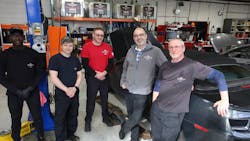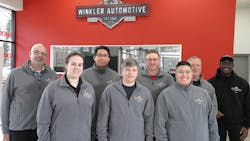Each shop owner has their own story of how they got to where they are now. For some, the automotive industry is all they’ve ever known, offering them a level of familiarity—but those who enter from other fields offer unique perspectives that may not be apparent to those already in the game.
When Karim Morsli decided to transition from information technology into being the owner of Winkler Automotive in Gaithersburg, Maryland, he saw vast opportunities for improvement: both in the industry and himself, as he adapted to and learned to thrive in a new field.
Tools and Technology
Morsli first came to the Gaithersburg area as a teenager in 1981. His family immigrated from Algeria after his father, a successful engineer, gained a position with the World Bank.
Morsli went on to study engineering himself in Canada and afterward went to Europe to study business, earning an MBA before spending some time working as a field engineer in the oil fields of Africa.
After returning to Maryland, starting a family, and running his own IT (information technology) company for a while, Morsli began to reflect on what legacy he would be setting with work.
“I knew I needed to do something different,” he remembers. “Right around that time my mother passed away, and my father had passed away a few years before; it was a very big turning point for me. I was questioning a lot of the things that I was doing, and what I was leaving behind, and so on.”
Throughout his life, Morsli always had a fascination with cars. Back in the late '90s, Morsli installed a touchscreen computer into his car, a 1997 BMW 3 Series. Everyone who saw his car was shocked to learn that it wasn’t a stock part, but that Morsli had supplied and installed it all himself.
Being involved with engineering and technology, his interest was in the increase of technology he saw blossoming in the automotive industry through the late 1990s to early 2000s, which was similar to what he was handling in IT.
Entering the world of automotive work was not an impulsive decision, however, Morsli challenged himself on whether this was just a hobby or something leading to a fulfilling career.
“I had been warned that you can't mix pleasure and business. So, I took it in stride, and I studied it for quite a few years before I thought, ‘Yeah, I think I'm cut out for it–I'm gonna give it a try,’” says Morsli.
Once he was prepared, he reached out to a longtime friend who owned a shop. Though he was surprised that Morsli wanted to transition from IT into automotive, he was prepared to help him hone his vision for what kind of shop he would run.
Morsli was put in touch with George Winkler, owner of Winkler Automotive for over three decades. Winkler was ready to retire, and it was a successful business that Morsli felt he could elevate to another level.
Teaching Old Dogs New Tricks
In December 2015, Morsli officially took the reins at Winkler Automotive and soon began implementing several improvements to the business’ operations, using his knowledge of IT as the foundation.
“When you want to improve an industry, you also have to really leave the door open to be able to look at what's going on in other industries because the disruptive ideas that are going to bring about amazing change are not necessarily in our industry, otherwise we'd be doing them,” Morsli explains.
When Morsli took over, one of the first new tools he introduced to his staff was digital vehicle inspections–something only a small number of shops were doing at the time. It digitized the typical maintenance checklist technicians would use while inspecting a vehicle and made it easier to share with the customer.
His shop was also an early adopter of cloud-based technology, storing invoice scans in Google Drive and using optical character recognition technology to find documents by simply entering a keyword in a search bar.
Digitizing these aspects of the work being done was part of Morsli’s vision to make everything run smoothly as well as more transparent for clients. Though the shop’s technicians initially weren’t sure about the change, they started to see how it was helping and embraced it.
Setting a New Standard
Ultimately, providing his technicians with all the tools they need to succeed is a huge part of what Morsli views as his job. Many of them weren’t used to working with bosses who felt that way, but he sees his success as being dependent on theirs.
“I practice servant leadership; I've always practiced it. That's how I was raised with my father,” says Morsli. “My father would always tell me, ‘Blue collar, white collar–it doesn't matter one bit. At the end of the day, we're all human beings, and we're all entitled to dignity.’ And so that's always stuck with me.”
The response he’s received from his staff has raised some concerns he has about how the industry is training and treating its technicians, and he hopes his shop will help raise the standard. With every job offer he gives, he puts everything that was agreed upon during the interview in writing—something that has taken some new hires by surprise.
Seeing professional workplaces where employees are respected and make a decent living is what attracts potential entry-level technicians. This is something many other industries realize and make a point to advertise to those entering the workforce.
“The amount of technicians that we're losing at the high school level just simply because they think they can do better as IT techs—or HVAC techs, or electric, e-techs—is quite scary.”
Only a quality business can attract quality employees. Morsli credits the success of his shop to the dedication of his entire team, and as a shop owner, he knows it’s his responsibility to provide them with every opportunity to succeed.
“What does treating your employees right mean? Respect them, honor your agreements with them, provide them training opportunities, help them grow by evaluating them frequently and giving them constructive feedback, and be a mentor to them and a leader,” Morsli says. “And that's, I think, what needs to happen more and more in our industry.”
About the Author
Kacey Frederick
Associate Editor
Kacey Frederick joined as the assistant editor of Ratchet+Wrench in 2023 after graduating from the University of Arkansas at Fort Smith with a bachelor’s in English and a minor in philosophy.
The grandchild of a former motorcycle repair shop owner, he’s undergone many trials and tribulations with vehicles. Now the proud owner of a reliable 2011 Toyota Camry, he works to represent those in the repair industry that keep him and so many others safely rolling on.




